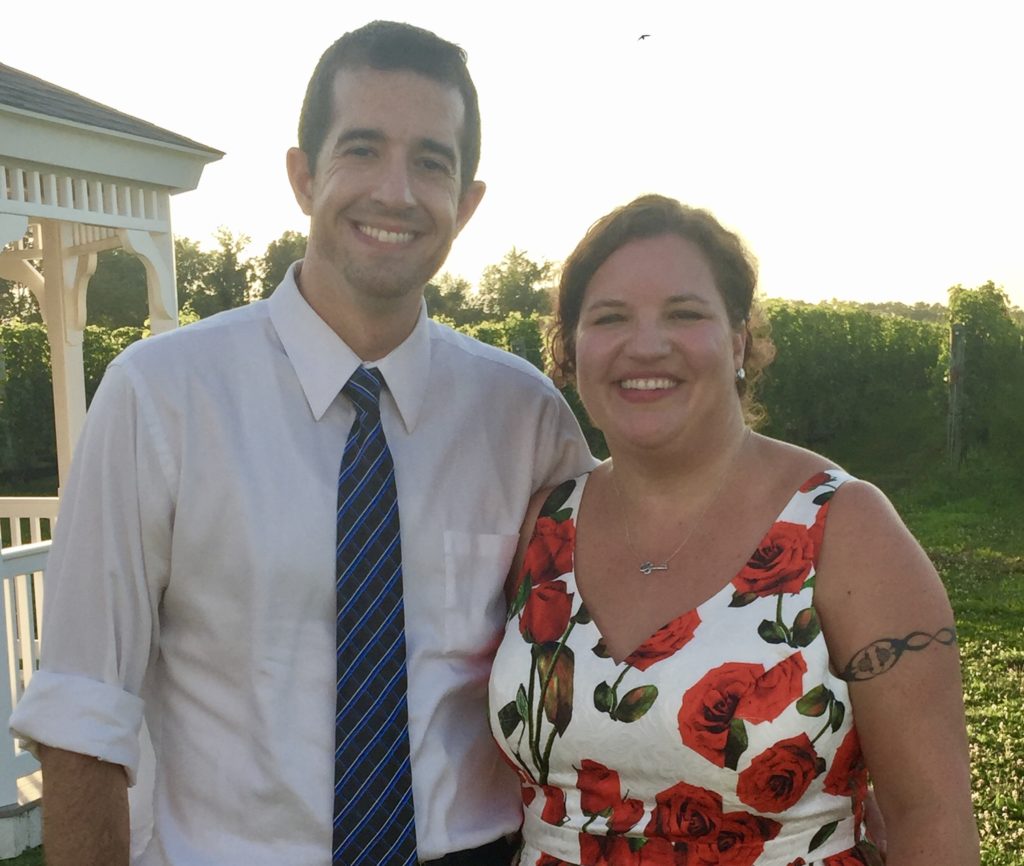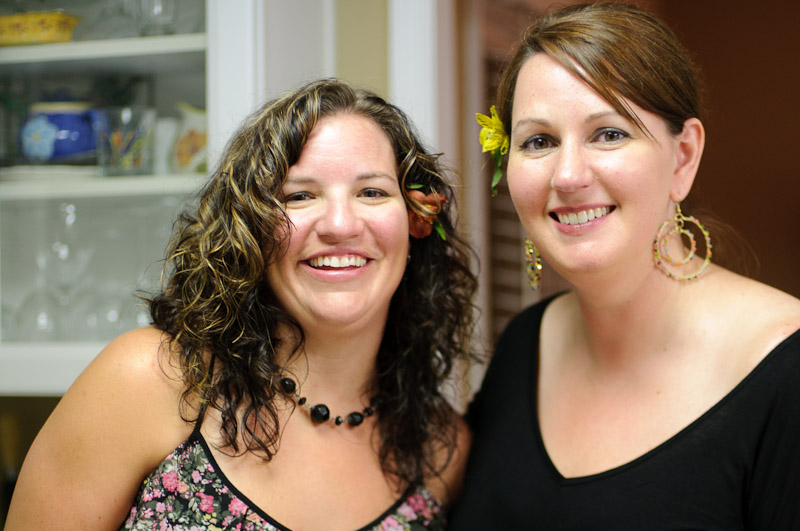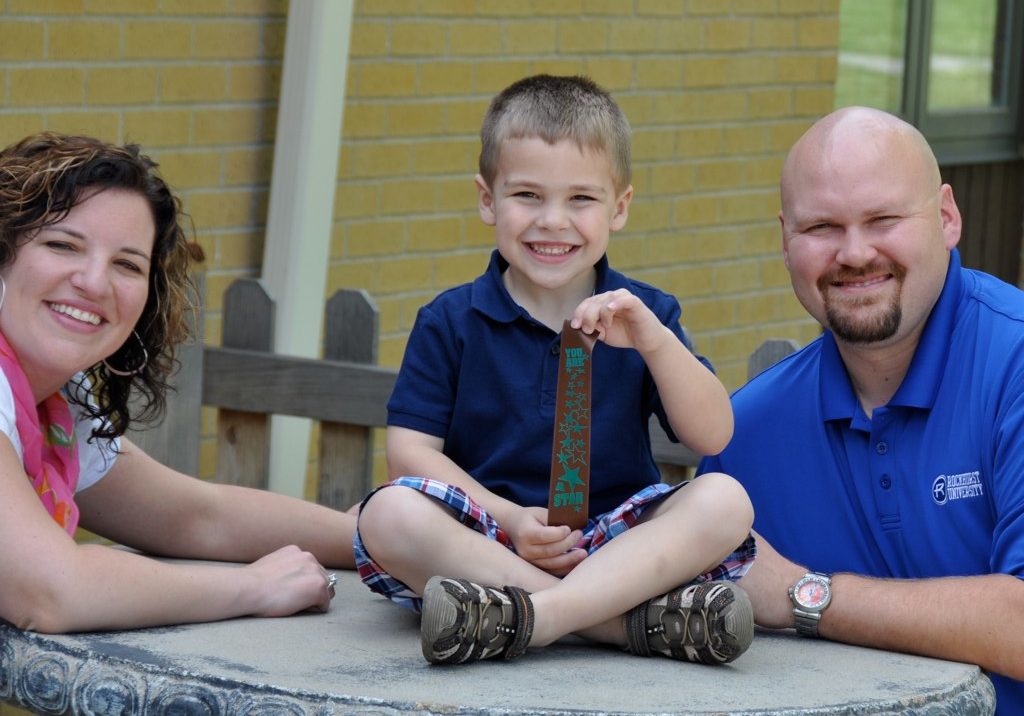In this #suedle – Sue’s trademark comic illustration – Sue describes what it felt like to meet Kristen for the first time and why their friendship and mental illness is so important to her and to the work they do.
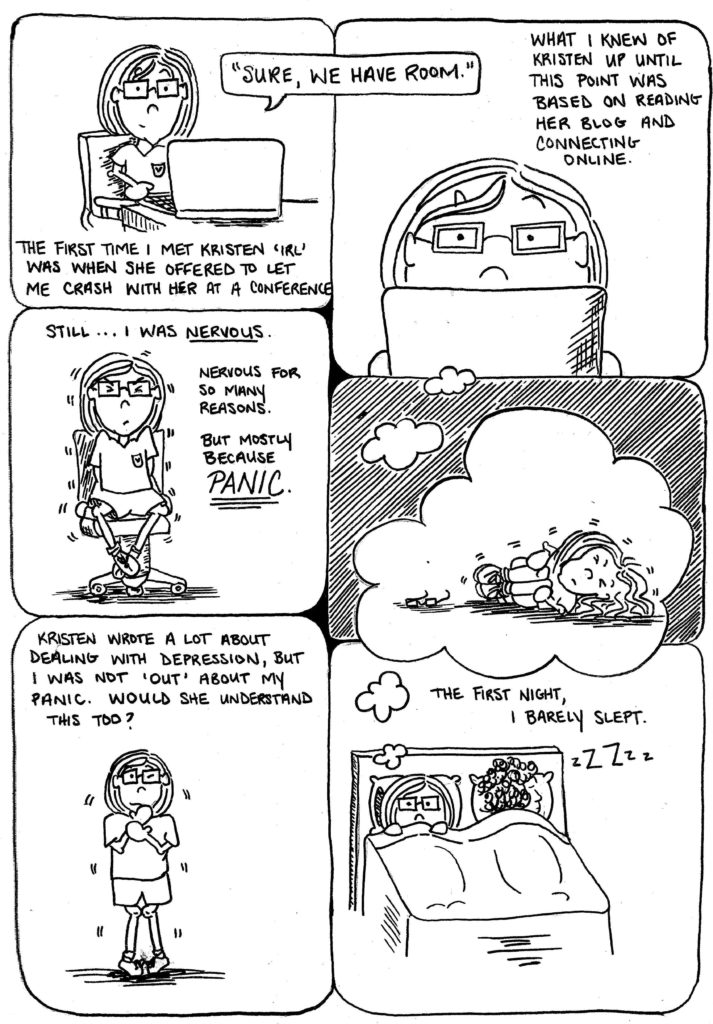
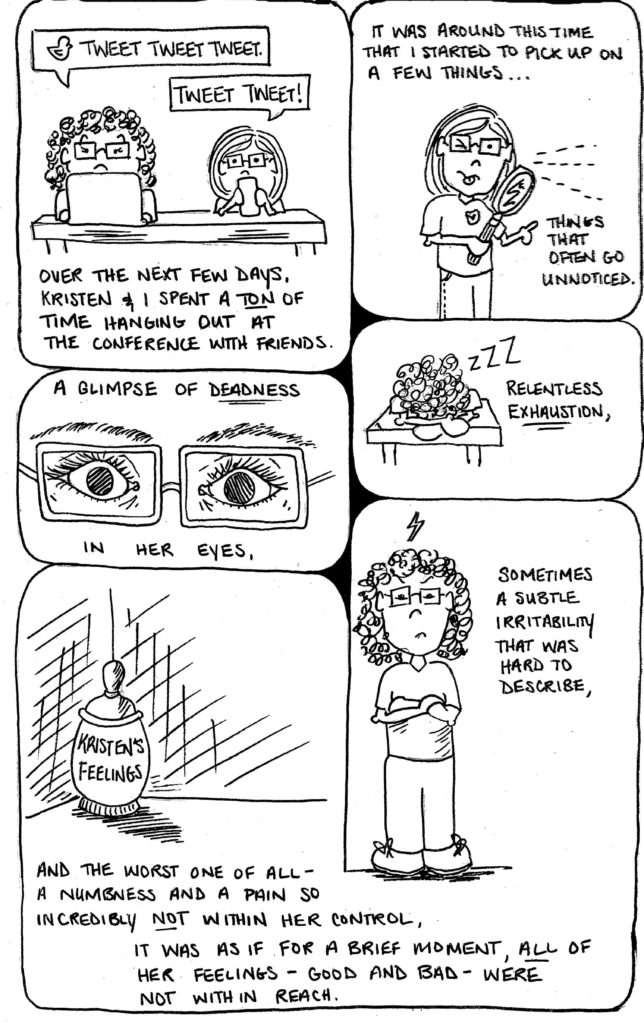
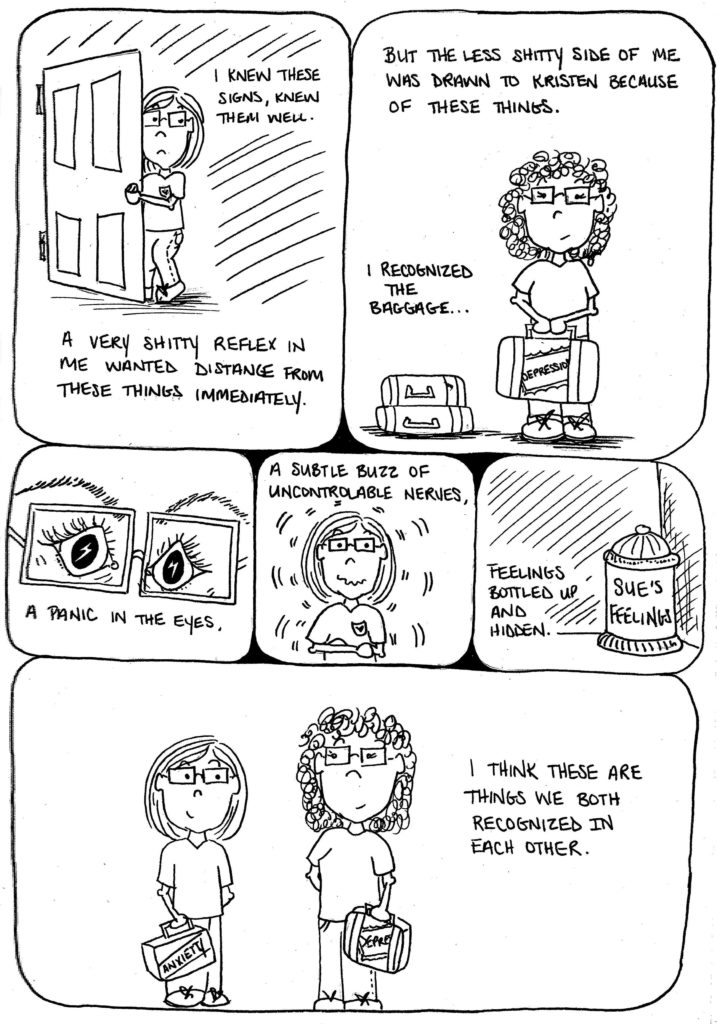
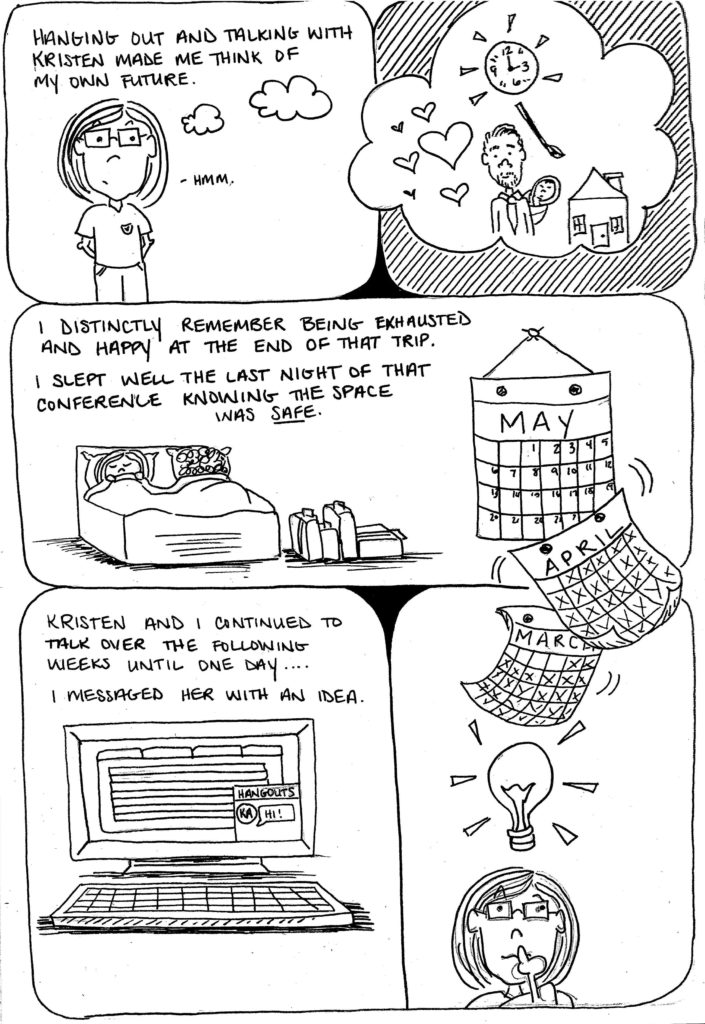
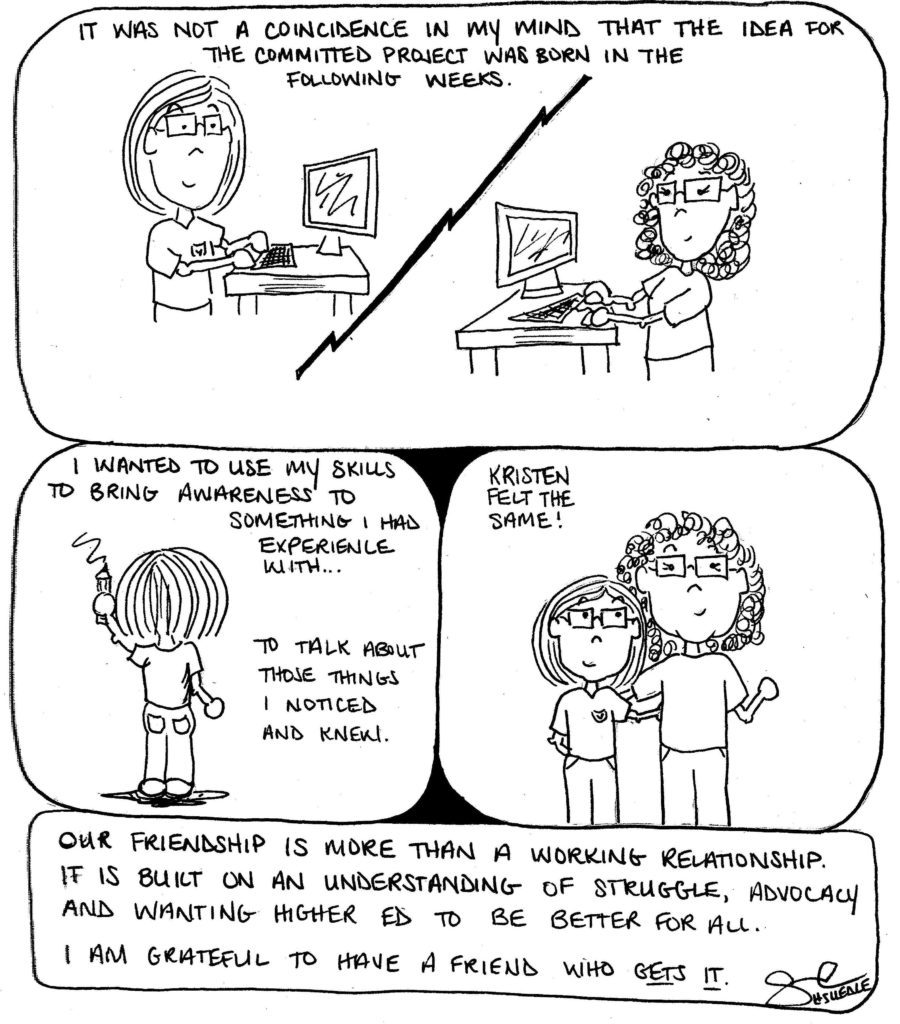
Comic Transcript
Kristen and Sue meet for the first time ‘IRL’
Frame 1
{Image description: Cartoon of Sue typing on a computer. The word bubble coming from the computer says “Sure, we have room.”}
The first time I met Kristen’IRL’ was when she offered to let me crash with her at a conference.
Frame 2
{Image description: Close-up of Sue peering at her computer with just eyes and nose visible}
What I knew of Kristen up until this point was based on reading her blog and connecting online.
Frame 3
{Image description: Sue is sitting in her desk chair, clenching the sides and shaking}
Still…I was nervous. Nervous for so many reasons. But mostly because PANIC.
Frame 4
{Image description: Sue standing with knees together, holding arms tight to her chest and shaking}
Kristen wrote a lot about dealing with depression, but I was not “out” about my panic. Would she understand this, too?
Frame 5
{Image description: Sue is in a double bed with Kristen turned to the side away from her sleeping. Sue is wide awake, holding the covers up over her mouth. A thought bubble floats above her in which she lays sideways on the floor holding her knees up to her chest with her eyes squeezed shut and shaking}
The first night, I barely slept.
Recognizing the signs
Frame 6
{Image description: Kristen and Sue sit side by side at a table. Kristen is on her laptop, and Sue is on her phone. The word bubbles above them say “Tweet tweet tweet.” “Tweet tweet!”}
Over the next few days, Kristen and I spent a ton of time hanging out at the conference with friends.
Frame 7
{Image description: Sue holds a magnifying glass and points as if to identify something}
It was around this time that I started to pick up on a few things…things that often go unnoticed.
Frame 8
{Image description: Close-up of Kristen’s eyes behind glasses. The irises are a solid black}
A glimpse of deadness in her eyes,
Frame 9
{Image description: Kristen is hunched over sleeping on a table}
Relentless exhaustion,
Frame 10
{Image description: Kristen stands with arms crossed and annoyed look on her face. A lightning bolt of irritation is above her head}
Sometimes a subtle irritability that was hard to describe,
Frame 11
{Image description: A small urn with “Kristen’s feelings” on it sits in a shadowed corner}
And the worst one of all – a numbness and a pain so incredibly not within her control, it was as if for a brief moment, all of her feelings – good and bad – were not within reach.
Deciding to stay
Frame 12
{Image description: Sue stands holding the door open and starting to leave the room}
I knew these signs, knew them well. A very shitty reflex in me wanted distance from these things immediately.
Frame 13
{Image description: Kristen stands holding a suitcase with the word “Depression” written on it. Two more suitcases are stacked next to her}
But the less shitty side of me was drawn to Kristen because of these things. I recognized the baggage…
Frame 14
{Image description: Close-up of Sue’s eyes behind glasses with lightning bolts in them}
A panic in the eyes,
Frame 15
{Image description: Sue has arms clenched around her and is shaking violently}
A subtle buzz of uncontrollable nerves,
Frame 16
{Image description: An urn sits in a shadowed corner with “Sue’s feelings” written on it}
Feelings bottled up and hidden.
Frame 17
{Image description: Sue stands next to Kristen, both holding suitcases. Sue’s suitcase has “Anxiety” written on it, and Kristen’s has “Depression” written on it}
I think these are things we both recognized in each other.
Friendship and mental illness
Frame 18
{Image description: Sue stands with arms behind her back, thinking and saying “Hmm.” Next to her, a thought bubble shows a clock, a paintbrush, hearts, a man with a baby and a house}
Hanging out and talking with Kristen made me think of my own future.
Frame 19
{Image description: Sue and Kristen sleep soundly in the double bed, their baggage is stacked on the floor next to the bed. A calendar is on the far right of the image, transitioning into the next frames. The pages showing the months of March and April fall from the calendar to indicate time passing, and May stays visible }
I distinctly remember being exhausted and happy at the end of that trip. I slept well the last night of that conference knowing the space was safe.
Frame 20
{Image description: A desktop computer with the screen visible. A “Hangouts” box is open in the bottom right corner with “KA: Hi!” written in it}
Kristen and I continued to talk over the following weeks until one day…I messaged her with an idea.
Frame 21
{Image description: Sue stands with finger on her lip, a lightbulb above her head is lit up}
An idea becomes a movement
Frame 22
{Image description: Sue is typing at her computer. A jagged line is drawn across the middle to indicate the distance between Sue and Kristen. Kristen is typing at her computer on the other side of the jagged line}
It was not a coincidence in my mind that the idea for The Committed Project was born in the following weeks.
Frame 23
{Image description: Sue stands with her back to the reader, pencil in hand and drawing a scribble}
I wanted to use my skills to bring awareness to something I had experience with…to talk about those things I noticed and knew.
Frame 24
{Image description: Sue and Kristen stand side by side with their arms around each other}
Kristen felt the same!
Frame 25
{No image}
Our friendship is more than a working relationship. It is built on an understanding of struggle, advocacy, and wanting higher ed to be better for all. I am grateful to have a friend who gets it.
{Signed “Sue #suedle”}
Sue is one of the co-founders of The Committed Project and is our Director of Visual Translation – you can see why. By day, she serves as the Director of Student Affairs at the Hofstra Northwell School of Medicine. But some of her most important work is the stuff she makes – Sue is an artist, an advocate for creativity as well as mental illness, and she develops relationships with people that make them better for knowing her.

